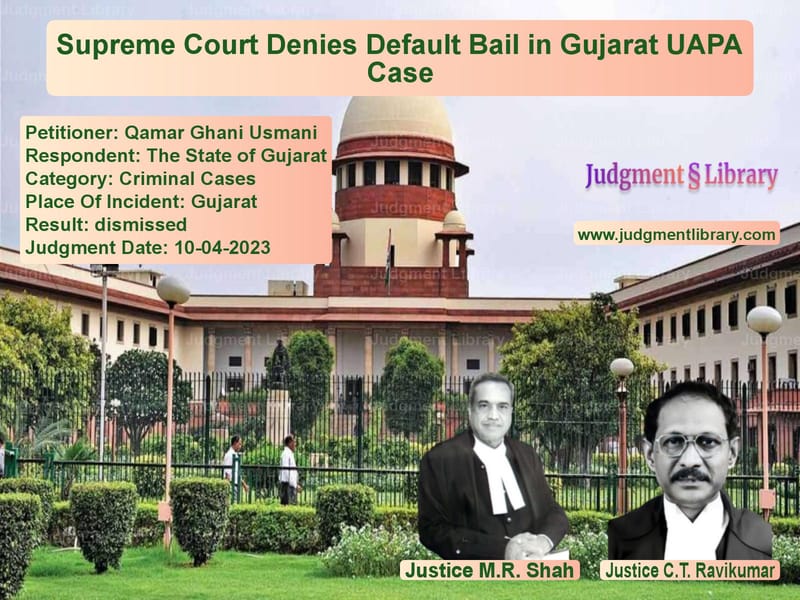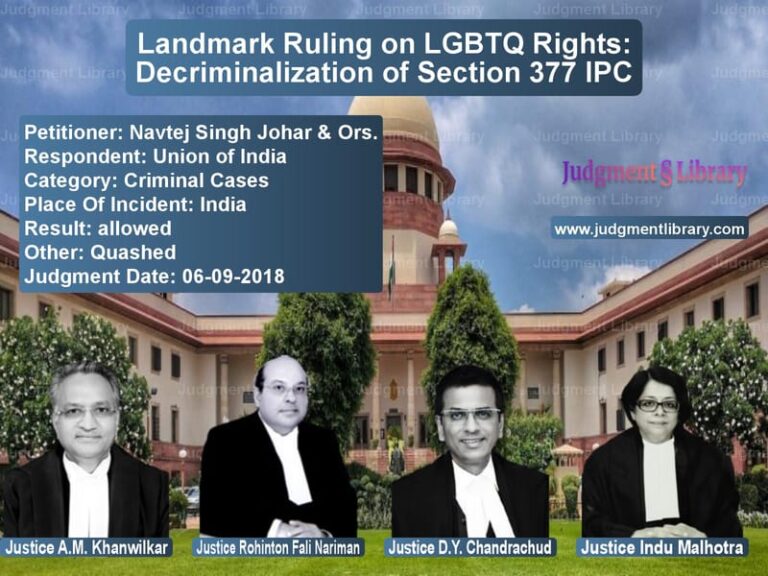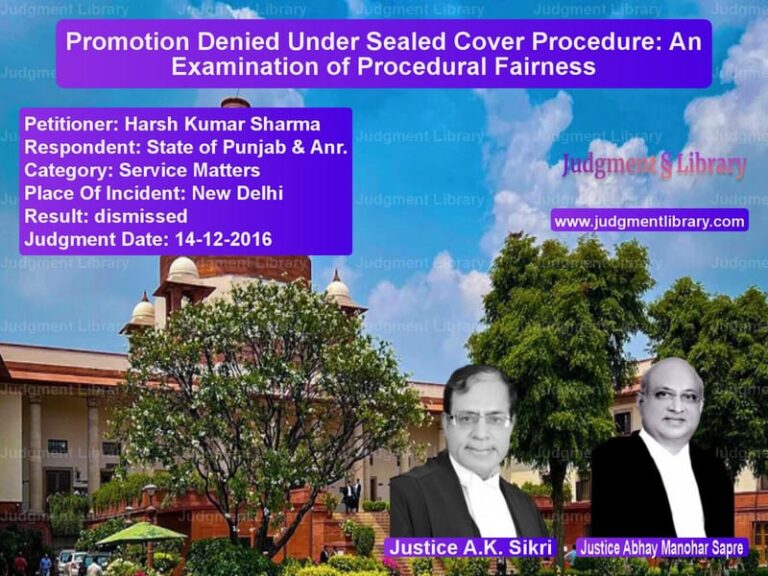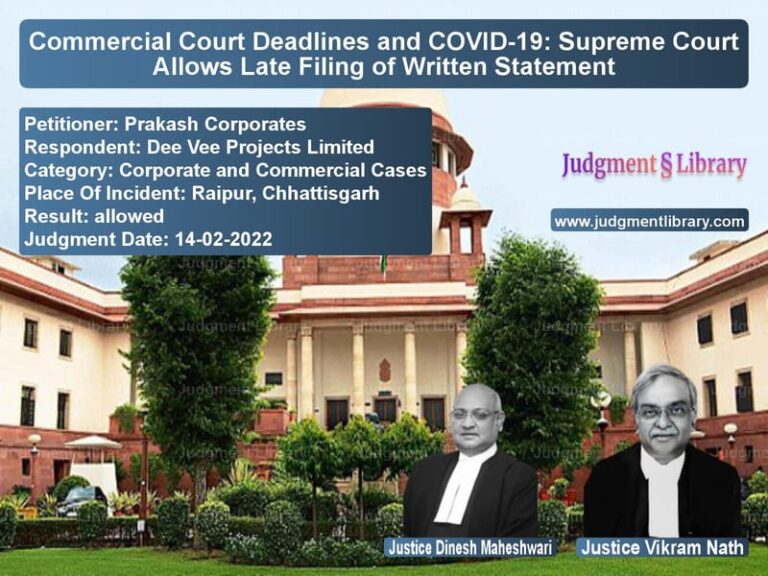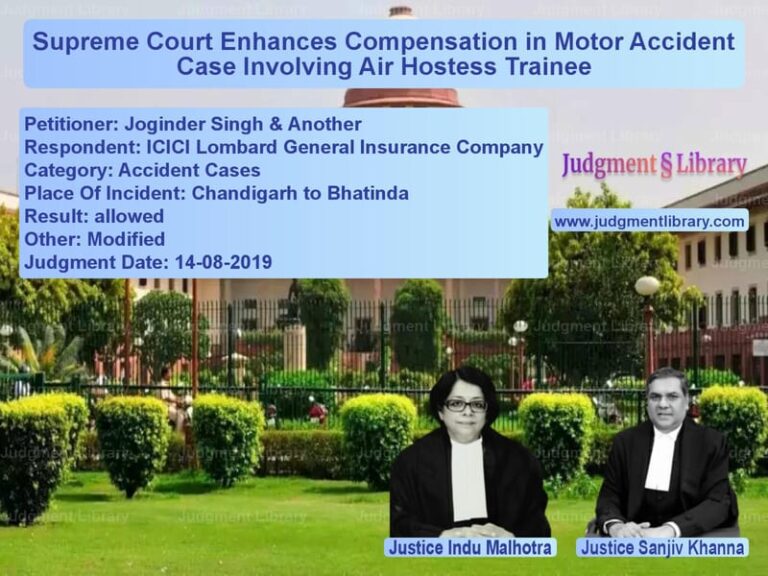Supreme Court Denies Default Bail in Gujarat UAPA Case
The case of Qamar Ghani Usmani vs. The State of Gujarat concerns the denial of default bail under Section 167(2) of the Code of Criminal Procedure (Cr.PC). The Supreme Court upheld the Gujarat High Court’s decision, ruling that the accused was not entitled to default bail despite procedural lapses in granting an extension for investigation. The case revolves around alleged offenses under the Unlawful Activities (Prevention) Act (UAPA) and the procedural validity of extending investigation deadlines without the accused’s presence.
Background of the Case
The appellant, Qamar Ghani Usmani, was arrested on January 29, 2022. Under Section 167 of the Cr.PC, the investigation had to be completed within 90 days, expiring on April 29, 2022. However, the prosecution sought an extension on April 22, 2022, which the trial court granted, extending the investigation period by 30 days.
The accused was informed of the extension on April 23, 2022. A second extension was granted on May 22, 2022, in the presence of the accused. Meanwhile, the accused had applied for default bail on May 10, 2022, arguing that the first extension was invalid as he was not present when it was granted. The trial court rejected his application, and the Gujarat High Court upheld the decision.
Legal Issues Before the Court
- Was the first extension of the investigation period legally valid despite the accused not being present?
- Did the accused acquire an indefeasible right to default bail on May 10, 2022?
- Was the accused entitled to relief under previous Supreme Court precedents on default bail?
Arguments by the Petitioner (Appellant – Qamar Ghani Usmani)
The appellant, through his counsel, argued:
- “The first extension granted on April 22, 2022, was illegal because the accused was not present during the hearing.”
- “As per the Supreme Court’s ruling in Hitendra Vishnu Thakur vs. State of Maharashtra, an accused must be given an opportunity to be heard before an extension is granted.”
- “The extension was invalid, making the accused eligible for default bail when the statutory period expired.”
- “Subsequent extensions cannot cure the illegality of the first extension.”
Arguments by the Respondent (State of Gujarat)
The State, represented by the Solicitor General, countered:
- “The accused was informed of the extension the very next day, fulfilling procedural requirements.”
- “The Supreme Court’s ruling in Sanjay Dutt vs. State clarified that an accused need not be served written notice before granting an extension.”
- “The accused waited until May 10, 2022, to challenge the extension, indicating he was aware of it but chose not to act immediately.”
- “The accused was present when the second extension was granted, showing that due process was ultimately followed.”
Supreme Court’s Analysis and Judgment
The Supreme Court upheld the Gujarat High Court’s decision and made the following key observations:
- “The accused was informed of the extension on April 23, 2022, and failed to challenge it until May 10, 2022.”
- “While procedural lapses occurred, they did not automatically grant the accused a right to default bail.”
- “The second extension, granted in the accused’s presence, validated the previous extension.”
- “Granting default bail in such cases would set a precedent that undermines procedural flexibility in serious offenses.”
The Court ruled:
“The appeal is dismissed. The accused is not entitled to default bail under Section 167(2) of the Cr.PC. However, he may apply for regular bail, which shall be considered on its own merits.”
Key Takeaways from the Judgment
- Default bail under Section 167(2) requires strict adherence to procedural lapses.
- Accused individuals must challenge illegal extensions immediately to claim statutory rights.
- Presence of the accused during an extension is preferable but not always mandatory.
- Judicial discretion plays a key role in determining whether procedural lapses warrant default bail.
Impact of the Judgment
This ruling reinforces the principle that default bail cannot be claimed purely on technical grounds if procedural lapses are corrected in due course. It underscores the need for timely objections by accused individuals and clarifies that serious offenses under UAPA require procedural flexibility. The judgment also ensures that courts retain discretion in interpreting procedural compliance while upholding constitutional rights.
Petitioner Name: Qamar Ghani Usmani.Respondent Name: The State of Gujarat.Judgment By: Justice M.R. Shah, Justice C.T. Ravikumar.Place Of Incident: Gujarat.Judgment Date: 10-04-2023.
Don’t miss out on the full details! Download the complete judgment in PDF format below and gain valuable insights instantly!
Download Judgment: qamar-ghani-usmani-vs-the-state-of-gujarat-supreme-court-of-india-judgment-dated-10-04-2023.pdf
Directly Download Judgment: Directly download this Judgment
See all petitions in Bail and Anticipatory Bail
See all petitions in Custodial Deaths and Police Misconduct
See all petitions in Terrorist Activities
See all petitions in Judgment by Mukeshkumar Rasikbhai Shah
See all petitions in Judgment by C.T. Ravikumar
See all petitions in dismissed
See all petitions in supreme court of India judgments April 2023
See all petitions in 2023 judgments
See all posts in Criminal Cases Category
See all allowed petitions in Criminal Cases Category
See all Dismissed petitions in Criminal Cases Category
See all partially allowed petitions in Criminal Cases Category

